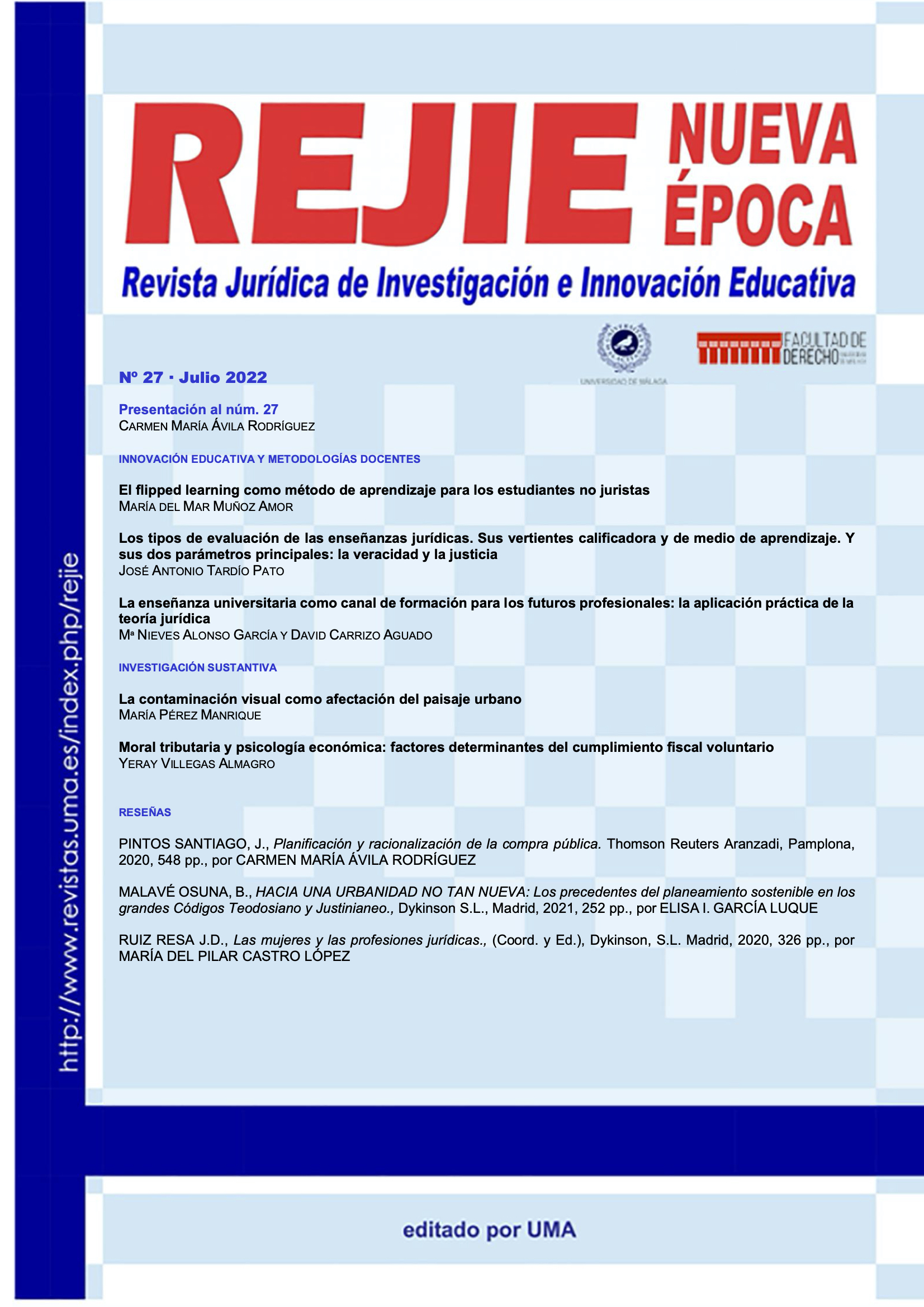Tax morale and behavioral economics: determinants of voluntary tax compliance
Keywords:
tax fraud, tax morale, behavioral economics, surveys, tax educationAbstract
This paper, presented on the basis of an empirical study carried out by means of a citizen survey, places the backbone of tax non-compliance in tax morale and economic psychology, both of the taxpayer and of the State. The study highlights the abandonment of the traditional economic approach, giving rise to a new approach that considers the incidence of very diverse determinants of citizens' behavior, such as the perception of the socio-economic reality or compliance with the constitutional principles governing the tax system on the part of the State. This leads to a reflection on its analysis, application and impact on the drafting of regulations, based on surveys, and the need for greater promotion of tax education to encourage citizens' knowledge on the subject
Downloads
Metrics
References
ALARCÓN-GARCÍA, G. (2018), “La conciencia fiscal”, en GIMÉNEZ-REYNA RODRÍGUEZ, E. (coord.), RUIZ GALLUD (coord.), ARRÁEZ BERTOLÍN, I. (pr.).: El fraude fiscal en España. Cizur Menor: Aranzadi Thomson Reuters [En línea] https://www.researchgate.net/publication/326425889_La_conciencia_fiscal.
ARIELY, D. & KREISLER, J. (2018), Las trampas del dinero: Cómo controlar tus impulsos, gastar con cabeza y vivir mejor. Barcelona: Ariel.
CALVO ORTEGA, R. y CALVO VERGEZ, J. (2020), Curso de Derecho Financiero [Cuso de Derecho Financiero. I. Derecho Tributario. Parte General y Parte Especial. II. Derecho presupuestario]. 24ª ed. Cizur Menor: Thomson Reuters Aranzadi, p. RB-3.3 (formato digital).
CENTRO DE INVESTIGACIONES SOCIOLÓGICAS (2020), “Opinión pública y política fiscal (XXXVII)”, Estudio nº. 3290. Madrid: CIS. [En línea] https://www.cis.es/cis/opencm/ES/1_encuestas/estudios/ver.jsp?estudio=14576
CONTHE, M. (2014), Pensar con arte: historias que el zorro le contó al erizo. Madrid: Biblioteca Nueva
CORTÉS DOMÍNGUEZ, M. & MARTÍN DELGADO, J.M. (1977), Ordenamiento Tributario Español I. Madrid: Civitas
CORTÉS DOMÍNGUEZ, M. (1965), “Los sujetos de la obligación tributaria”, Revista de administración pública, 48: pp. 9–106. [En línea] http://dialnet.unirioja.es/servlet/oaiart?codigo=2115754
DELGADO LOBO, M.L., FERNÁNDEZ-CUARTERO PARAMIO, M., MALDONADO GARCÍA-VERDUGO, A., ROLDÁN MUÑÍO, C. & VALDENEBRO GARCÍA, M.L. (2005), “¿Por qué una educación fiscal?” en AA.VV. (2005): La educación fiscal en España [DOC. NÚM. 29/05]. Madrid: Instituto de Estudios Fiscales
ESCRIBANO LÓPEZ, F. (2012), “El conflicto de las normas y la simulación en la jurisprudencia del Tribunal Constitucional”, en HINOJOSA TORRALVO, J. (dir.) y LUQUE MATEO, M. (coord.): Medidas y procedimientos contra el fraude fiscal. Barcelona: Atelier, pp. 127-151.
GARCÍA BERRO, F. (2018), Elusión tributaria y cláusulas antiabuso en la jurisprudencia del Tribunal Supremo. Madrid: Fundación Impuestos y Competitividad
GRANDE SERRANO, P. (2019), “La psicología económica como herramienta para incentivar el cumplimiento voluntario de las obligaciones tributarias”, Revista de Contabilidad y Tributación. CEF, 439: pp. 5-36.
GRAU RUIZ, M.A. (2021), “La opinión de la ciudadanía como dato valioso para la acertada toma de decisiones tributarias: ¿uso prospectivo de barómetros fiscales en tiempos de reforma?”, Revista Técnica Tributaria, 133: pp. 9-14.
HINOJOSA TORRALVO, J.J. (1992), “La conexión del ingreso y el gasto a través de los principios de justicia. Notas para su análisis”, en La evolución del Derecho en los diez últimos años. Málaga: Tecnos, pp. 314-330.
HINOJOSA TORRALVO, J.J. (2012), “El fraude fiscal: una lucha de contrastes”, en HINOJOSA TORRALVO, J. (dir.), y LUQUE MATEO, M. (coord..): Medidas y procedimientos contra el fraude fiscal. Barcelona: Atelier, pp. 459-472.
HINOJOSA TORRALVO, J.J. (2014), “Simulación tributaria y delito fiscal. Un análisis jurisprudencial”, en ADAME MARTÍNEZ, F. y RAMOS PRIETO, J. (coords.): Estudios sobre el sistema tributario actual y la situación financiera del sector público. Homenaje al Profesor Dr. D. Javier Lasarte Álvarez. Madrid: Instituto de Estudios Fiscales, pp. 2285-2300.
ISENSEE, J. (1994), StuW. Cit. por TIPKE, K. (2002), Moral tributaria del Estado y de los contribuyentes. (HERRERA MOLINA, P.M., Trad.). Madrid: Marcial Pons.
KAHNEMAN, D. y TVERSKY, A. (1972), “Subjective Probability: A Judgment of Representativeness”, Cognitive Psycology, 3: pp. 430-454
LEWIS, M. (2017), Deshaciendo errores: Kahneman, Tversky y la amistad que nos enseñó cómo funciona la mente. Barcelona: Debate
MACINTYRE, A. (1987), Tras la virtud (AMELIA VALCÁRCEL, Trad.). Barcelona: Crítica. (Obra original publicada en 1984).
MCCAFFERY, E. J. & BARON, J. (2004), “Framing and taxation: evaluation of tax pólices involving household composition”, Journal of Economic Psychology, 25(6): pp. 679-705.
MENE?NDEZ MORENO, A. (2018), Derecho financiero y tributario. Parte general: Lecciones de Ca?tedra (19a ed.). Valladolid: Lex Nova.
OECD (2019), Tax Morale: What Drives People and Businesses to Pay Tax? París: OECD Publishing. [En línea] https://doi.org/10.1787/f3d8ea10-en.
PONT MESTRES, M. (1981), “La justicia tributaria y su formulación constitucional”, Revista Española de Derecho Financiero, 31: pp. 365-403.
RODRÍGUEZ BEREIJO, A. (2005), “Breve reflexión sobre los principios constitucionales de justicia tributaria”. Revista jurídica Universidad Autónoma de Madrid, 13: pp. 235–251. [En línea] http://dialnet.unirioja.es/servlet/oaiart?codigo=2166054
SANZ GÓMEZ, R. (2020), “Progresividad fiscal (España)”, Eunomía. Revista en Cultura de la Legalidad, 18: pp. 311-326. [En línea] https://idus.us.es/handle/11441/95934
SCHENEIDER, D. (1997), Der Betrieb. Cit. por TIPKE, K. (2002), Moral tributaria del Estado y de los contribuyentes. (HERRERA MOLINA, P.M., Trad.). Madrid: Marcial Pons.
SCHENEIDER, F. y TORGLER, B. (2007), “The Impact of Tax Morale and Institutional Quality on the Shadow Economy”, IZA DP, 2541. [En línea]: https://ssrn.com/abstract=958248
SCHEUNER, U. (1974), Essener Gespräche zum Thema Staat und Kirche. Mu?nster: Aschendorff.
SPENGLER, O. (1924), Neubau des Reiches. München: C.H. Beck'sche Verlagsbuchhandlung
STRÜMPEL, B. (1969), “The Contribution of Survey Research to Public Finance”, en Quantitative Analysis in Public Finance (Ed., A. T. Peacock). New York: Praeger Publishers, pp. 14-32.
THALER, R. & SUNSTEIN, C. R. (2003), “Libertarian Paternalism”, American Economic Review, 93(2): pp. 175-179. DOI: 10.1257/000282803321947001
THALER, R. H. (2018), “Economía del comportamiento: pasado, presente y futuro”, Revista de Economía Institucional, 20(38): pp. 9-43
TIPKE, K. (2002), Moral tributaria del Estado y de los contribuyentes. (HERRERA MOLINA, P.M., Trad.). Madrid: Marcial Pons.
TORGLER, B. y SCHALTEGGER, C. (2005), Tax Morale and Fiscal Policy. [En línea] https://www.researchgate.net/publication/5010351_Tax_Morale_and_Fiscal_Policy
VÁSCONEZ, B. (2011), “Metodologías para medir la moral tributaria de los contribuyentes y los resultados obtenidos” en Centro Interamericano de Administraciones Tributarias: La moral tributaria como determinante en el mejoramiento de la eficacia de la administración tributaria (Asamblea General del CIAT, No. 45, Quito, Ecuador, 2011). Quito: CIAT, pp. 145-191. [En línea] https://biblioteca.ciat.org/opac/book/4889
Additional Files
Published
How to Cite
Issue
Section
License
Sin perjuicio de lo dispuesto en el Texto Refundido de la Ley de Propiedad Intelectual, aprobado por Real Decreto Legislativo 1/1996, de 12 de abril, y conforme al mismo, los autores/as ceden a título gratuito, de modo no exclusivo y sin límite temporal los derechos para difundir, reproducir, comunicar y distribuir, en cualquier formato actual o futuro (papel o electrónico), a la Universidad de Málaga (UMA), a fin de que sea publicado en REJIE Nueva Época.
Al realizar el envío, el autor declara que el contenido esencial del mismo no ha sido publicado ni se va a publicar en ninguna otra obra o revista mientras esté en proceso de evaluación en REJIE Nueva Época, comprometiéndose en todo caso a comunicar de inmediato al equipo editorial de la revista cualquier proyecto de publicación de dicho texto, y citando expresamente a la revista en el nuevo proyecto.
Todos los contenidos publicados por REJIE Nueva Época están sujetos a la licencia de Creative Commons Reconocimiento 4.0 Internacional, cuyo texto completo se puede consultar en https://creativecommons.org/licenses/by/4.0/legalcode
Conforme a la misma, se permite la copia, distribución, comunicación pública, obras derivadas y el uso comercial de los contenidos siempre que la fuente y el autor del texto sean citados Así, cuando el autor/a envía su colaboración está explícitamente aceptando esta cesión de derechos de edición y de publicación.
Es responsabilidad de los autores obtener los permisos necesarios de las imágenes que están sujetas a derechos de autor.



20.png)
